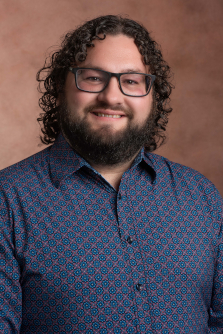
Dr. Jondle completed his undergraduate degree in 2012 at the University of Wisconsin-Green Bay. He then went to the University of North Dakota and obtained a PhD in Microbiology and Immunology in 2017. While at UND, he studied under Dr. Jyotika Sharma and was awarded the American Association of Immunologist (AAI) Careers in Immunology Fellowship in 2016 for his research focusing on bacterial-host interactions. Upon completing his PhD, Dr. Jondle went to the Medical College of Wisconsin for a postdoctoral fellowship in the lab of Dr. Vera Tarakanova. There, he switched focus to viral-host interactions, specifically focusing on oncogenic gammaherpesviruses. As a postdoctoral fellow, Dr. Jondle was awarded a 3-year American Cancer Society Fellowship in 2019 for his groundbreaking discovery that the proinflammatory cytokine IL-17A is proviral in the context of gammaherpesvirus infection. In August 2022, Dr. Jondle joined the Department of Investigative Medicine and the Center for Immunobiology at WMed.
Research Focus
The Jondle lab studies oncogenic gammaherpesviruses. Epstein-Barr virus (EBV) and Kaposi’s Sarcoma associated herpesvirus (KSHV) are human specific gammaherpesviruses that infect >95% of all adults, establish lifelong infections, and are associated with multiple cancers, including B cell lymphomas. These viruses usurp B cell differentiation to establish a latent viral reservoir in memory B cells. They achieve this by infecting naïve B cells and inducing a germinal center response which includes both virus-infected and uninfected B cells that subsequently differentiate into class-switched plasma cells, where viral reactivation occurs, or memory B cells that host life-long latent infection. Because germinal center B cells undergo rapid cellular division (~every 8hrs), gammaherpesviruses use this to their advantage to exponentially increase the cellular reservoir of latent infection. Interestingly, the germinal center response driven by gammaherpesviruses is qualitatively distinct from physiological B cell differentiation as it results in a robust, albeit transient increase in class-switched polyclonal antibodies with reactivities against irrelevant non-virus antigens. Despite the unique nature of the gammaherpesvirus-driven germinal center response, little is known about the mechanisms involved.
The germinal center stage of B cell differentiation is susceptible to cellular transformation, as germinal center B cells rapidly divide while downregulating tumor suppressors and increasing expression of mutagenic enzymes. Consequently, many gammaherpesvirus-driven B cell lymphomas are of germinal center or post germinal center origin. Importantly, increased viral reactivation often precedes tumorigenesis. The mechanisms by which gammaherpesviruses induce the robust polyclonal germinal center response that seeds viral lymphomagenesis and the factors that promote viral reactivation that contributes to lymphomagenesis are poorly understood.
Studies of chronic EBV or KSHV infection are challenging due to the species specificity of these viruses. To overcome this limitation, the Jondle lab utilizes murine gammaherpesvirus 68 (MHV68), a natural rodent pathogen that is genetically and biologically related to EBV and KSHV. MHV68 offers a tractable animal model of chronic gammaherpesvirus infection and pathogenesis that benefits from powerful tools of host and virus genetics along with mouse immunology.
Using MHV68, the focus of the Jondle lab is to uncover and study host mechanisms which regulate or promote gammaherpesvirus-driven germinal center response, viral replication, reactivation, latency, and tumorigenesis. Prior to establishing his independent lab, Dr. Jondle made the exciting discovery that IL-17A is selectively proviral to gammaherpesviruses by promoting the gammaherpesvirus-driven germinal center response and viral reactivation. Early work in the lab will focus on defining the mechanism by which IL-17A promotes gammaherpesvirus infection. Future work will expand to understand the significance of naturally induced IL-17A and its impact on chronic gammaherpesvirus infection and gammaherpesvirus induced-lymphomagenesis or vice versa. Other projects in the lab will identify additional host factors which the virus may usurp for its benefit or which work to restrict viral infection.
Lab Personnel
 |
 |
Recent Publications
Our laboratory group is committed to pursuing inquiry, disseminating knowledge, and fostering critical thinking that encourages lifelong learning. Take a look at a comprehensive listing of Dr. Jondle’s most recent publications.


